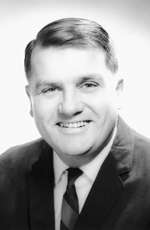Donald Pinkel
Donald Paul Pinkel (born September 7, 1926 in Buffalo, New York) is an American medical doctor who specializes in pediatric hematology and oncology. He was born in Buffalo, New York and graduated from Canisius High School in 1944.[1] He has made contributions to cures for several forms of childhood cancer, including leukemia.[2] He has received many awards and recognitions for his research work, including the Albert Lasker Award for Clinical Medical Research in 1972, the Kettering Prize for cancer research in 1986,[2] and the Pollin Prize for Pediatric Research in 2003.[3] Pinkel was the first director of St. Jude Children's Research Hospital in Memphis, Tennessee, serving from 1962 to 1973.[2][4] He has also authored or co-authored numerous books, chapters in books, and journal articles.[2]

Early career
Pinkel himself was the victim of another devastating childhood disease. In 1954, as a pediatrician in the Army Medical Corps in Massachusetts, Pinkel contracted polio. For months, he was paralyzed; the Army retired him because he was unfit for duty; and he spent the better part of a year in rehabilitation, learning how to walk again. He first was dependent on a wheelchair, then was able to walk using braces, and later crutches.
As his condition improved, Pinkel began working with eminent researcher Sidney Farber in Boston, experimenting with aminopterin, which could induce temporary remissions in some leukemia cases.
In 1956 Pinkel was hired as the first chief of pediatrics at Roswell Park Cancer Institute in Buffalo. He soon found that Buffalo's cold humid climate played havoc on his polio-compromised lungs, and he repeatedly contracted pneumonia. He began looking for a more beneficial situation.[5]
Director of St. Jude Children's Research Hospital
In 1961 Pinkel met the Lebanese-American entertainer Danny Thomas, who was spearheading the foundation and construction of a children's research hospital, called after St Jude, the patron of the hopeless, to be based in Memphis, Tennessee. He visited the budding project in 1961, and decided to become a founding member, taking a significant pay reduction to make the move.[5] He served as the first director and CEO of St. Jude Children's Research Hospital from February 1962 (when it opened) to 1974, focusing on Acute lymphoblastic leukemia (ALL), the most frequent cancer in young children. His team identified four major obstacles to its cure: drug resistance, drug toxicity, meningeal relapse, and most important, pessimism.
Pinkel's team instituted a treatment program aimed at permanent cure of ALL. Called "Total Therapy," it was based on all the available relevant laboratory and clinical research and experience. There were four phases: remission induction, remission consolidation or intensification, specific pre-emptive meningeal treatment and continuation chemotherapy for 3 years. Both radiotherapy and instillation of drug directly into spinal fluid were used for meningeal treatment. Eventually a 50% cure rate was achieved in the 1967-68 study V; this cure rate continues for the children in this study 40 years later. This was the first significant cure rate for generalized cancer and for primarily drug treatment of cancer.
This four-phase treatment plan is still used today with numerous modifications. Increases in resources and trained physicians and nurses, better infection control, safer blood transfusion and newer drugs and drug schedules have increased the reported cure rates to 75-85% of treated children with ALL in developed countries. Better use of drugs both systemically and by instillation into the spinal fluid have replaced the need for radiation therapy to pre-empt meningeal relapse in most children with ALL.[6]
Later career
By 1968 it was becoming evident that Pinkel's approach was successful. He spent the next several years publishing his findings and refining the procedure, allowing it to be more individualized for each patient. He then resigned as the hospital’s director, and took leadership roles at a series of hospitals or faculties, in Milwaukee, then Los Angeles, Houston, and Corpus Christi, Texas.
Personal
Pinkel married Marita Donovan in December 1949.[7] He now lives with his second wife Cathryn Howarth, with whom he has one child. In total he has 10 children and 16 grandchildren. After retiring, Pinkel retired to San Luis Obispo, California. His polio symptoms returned during his retirement years, and he uses a cane or braces for walking. He occasionally lectures on medical subjects, at nearby California Polytechnic State University.[5]
Awards
Pinkel received numerous recognitions for his contributions to the cure of childhood leukemia and other forms of pediatric cancer: the Lasker Award for Medical Research, the Kettering Prize for Cancer Research, and the Pollin Prize for Pediatric Research. The American Cancer Society gave him its Annual Award for Clinical Research; the Leukemia-Lymphoma Society of America awarded him its Return of the Child award. In Germany he received the Zimmerman Prize for Cancer Research and in the United Kingdom the Leukemia Society Annual Lectureship and the Royal College of Pediatrics and Child Health biennial Windermere Lectureship.
See also
References
- "Donald Pinkel". Retrieved 14 March 2009.
Dr. Donald Pinkel, pediatrician, has received numerous recognitions for his contributions to the cure of childhood leukaemia and other forms of pediatric cancer. These include international awards: the Lasker Award for Medical Research, the Kettering Prize for Cancer Research and the Pollin Prize for Pediatric Research.
- "Four Physicians Honored for Their Historic Contributions to the Treatment of Pediatric Leukemia - New York Presbyterian Hospital". 19 December 2003. Retrieved 14 March 2009.
The 2003 Pollin Prize, the sole international award for advances in children's health care, is awarded to Drs. Emil Frei, Emil J. Freireich, Donald Pinkel, and James F. Holland. An awards ceremony takes place today at NewYork-Presbyterian Hospital.
- "Stanford St. Jude Championship - 50 Memorable Moments at St. Jude Children's Research Hospital". Retrieved 14 March 2009.
Donald Pinkel, MD, is hired as the first medical director of St. Jude
- < Sides, Hampton, Childhood Leukemia . . Smithsonian, July 2016
- "Dr. Donald Pinkel", St. Jude Children's Research Hospital
- "Engagements and Weddings". Buffalo Courier Express. January 1, 1949.